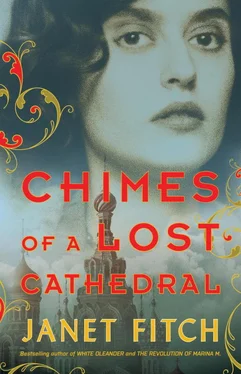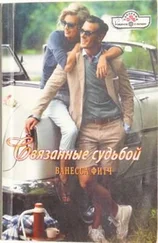“Gently, please.” Sweat and tears stung my eyes. “Gently…” Oh God, please let this be over soon, please help Iskra. She’d been through so much already. “It’s going to be all right, kitty-cat. Just another minute. We’re going to fix you right up.” Hoping I wasn’t lying.
“Now you just gotta feel around for where it pops in.” He secured his tongue in the corner of his mouth and lowered the forearm and moved it across her body, holding the upper arm tight, completely resistant to her piercing shrieks. Then he rotated it outward, the arm at a ninety-degree angle, feeling, listening with his fingers like a safecracker. “Vot.” There. She gave one last body-shaking scream—and stopped.
The boy grinned shyly, as if it were nothing, but I could tell he was bursting with pride as he handed her back to me. I held her against my breast, rocking her, begging her to forgive me, thanking him, thanking all of them, and whatever sloppy God was watching and not watching. I wrapped her cloth around her shoulders so she couldn’t move her arm, and turned to lift my skirt to remove half the food I was carrying, and pressed into dirty hands—cheese, chunks of bread. “Forget you saw any of this.”
“Saw what?” the boy said, already eating. “You think any of us talks to the Cheka? That’s nuts.”
“Good luck, boys. Thank you.”
“Good luck, mamenka .” Once we’d regained our composure, I carried Iskra back through the crowded car, quietly, quietly, as Ukashin had taught us to do. I’m a shadow, I’m a figure in your dreams. I’m a ghost, I’m nothing. I’m smoke. I’m no one. Anyone who saw me would recognize me, the girl with the baby. My shoes were sticky with blood. I could feel the tack against the rubber of the floor. Was I covered with it? The cloth, my dress?
Finally, I knew I was back in my little enclave when I recognized the whistle of the shipping clerk. I lifted Iskra onto my bunk, and clambered up, quick as a monkey, careful as a thief. How long had I been gone? Twenty minutes? An hour? Once in my place by the ceiling, I quickly cut a strip from one of the diapers—with the scissors my victim had saved for me!—and made a brace for her, tying it gently across the arm. Oh, oh, I know, I know. Please don’t start screaming again. I carefully bandaged her arm and collarbone and swaddled her up tight, then put her to my overflowing breast like a fountain, and lay as quietly as I could, through the thunder of my heart. Someone was dead because of me. And I would do it again. Anyone in this life who wanted to hurt my child would find me as cold-blooded a killer as any Chekist.
I dozed a bit toward morning. In my dreams, I was back at Furshtatskaya Street, tending chickens in a locked room, caring for them among the embroidered chairs and the polished parquet. The next thing I knew, people were talking. I peeked over the side and saw that they’d already put up the middle bunks. I’d been sleeping so heavily I hadn’t noticed. Natalya Romanovna was combing her hair. The man from Eliseev’s washed his hands and face with a little boiled water poured onto his handkerchief.
“He was stinking drunk last night,” said the woman, working out a snarl in her hair. “It was awful. He pinched me when I was getting ready for bed.”
They were talking about the Chekist. I pretended to awaken, yawning.
“Maybe he’s gone to the toilet,” said the spets .
“Maybe he found someone to play chess with in another car,” said the timber man, whom he’d beaten in seven moves and never played with again.
“Well, good riddance,” said the wife. “A very unpleasant man.”
The boy said nothing as he stood at the window, ostensibly looking out at the fresh sunlit morning, but he kept stealing looks at me over his shoulder. Had he seen me get up, and the agronomist follow me? I wouldn’t know until we were searched again, until the railroad Cheka walked between the rows of bunks, until we showed our papers and answered their questions. Would he blurt it out, betray me for revenge? I had to get rid of the gun. Maybe Mama Natalya’s sewing basket? That would be a rude surprise. The man’s valise was still under his bunk. Surely they would find it, open it, and ask whose it was, what had become of him. The railroad Cheka would notice any blood. I looked down at my dress, with the torn buttons. It was dark with a pattern of cherries, but the baby’s white cloth was spattered in red. I turned it, refolded it so the blood went to the inside. My boots had a line of blood at the sole, I could disguise it if I stepped in some water. I drank from a cup the timber man passed across to me, and saved a bit to wash my own hands and face.
I spent the rest of the day worrying about the gun, and the children, the people who had seen me. Should I throw it down the toilet? Give it to the boys still riding the rear of the car? They could sell it and get something to eat. Each search increased my chances of being caught, and a girl with a gun nowadays would be considered a potential Fanya Kaplan, Lenin’s would-be murderer. Who was I traveling to Petrograd to assassinate? I had been raped before, I might not have shot him even to prevent him from fucking me—but he’d hurt Iskra. If he had gotten her out of the cloth, he would have thrown her on the floor, even down the toilet onto the tracks. But now it was he who was on the tracks somewhere to the east of us, where he belonged. Give up this gun? Going to Petrograd, which by all accounts had become an even more dangerous place than it had been when I left it? Where Arkady and people like him still walked the streets? Even if I had to suffer an agony of suspense each time we were searched, I would not give it up. I’d never be able to replace it.
The Chekist never did come back, and no one gave a damn. The spets ’s family were able to spread out, the boy had a bunk to himself again. It didn’t keep him from staring at me at odd moments, though. I sensed he knew something, but I couldn’t ask. Every hour that passed, every mile we were farther away from that stretch of track, I felt less terrified. And now the familiar stations began to appear. Cherepovets. Babayevo. Tikhvin.
Tikhvin! I dared not get out to walk, in case my one-armed mechanic was at the station. I thought of Avdokia—how I wished she were here. I ached for her gnarled hands, her pity, her love. But I had to go on alone. Could not retreat to the infantilism of bourgeois motherhood. Theotokos, have mercy on us all.
When I went back to the toilet, the children I had seen that night were gone, replaced by new orphans, who stared at me with the same hunger I was used to seeing. The others must have gotten off, deciding to try their luck at other stations.
One more day. My fellow passengers gathered up their bundles, straightened their clothes. I had sewn up my dress with a borrowed needle and thread, fashioning some elegant new buttons out of the hem—cut, rolled, and sewn. Again, the lessons of Ionia had not been lost on me.
As we approached the city—city of my heart, my arteries sluicing under its bridges, Petersburg!—the train slowed to a walking pace, that brutal grinding of metal against ungreased metal. From the window, I could see not only bagmen but ordinary citizens jumping off not in twos or threes but by the scores—falling, rolling, scrambling to their feet and disappearing into the shaggy woods on the outskirts of the city, dragging their bags and suitcases of illegal foodstuffs. Hundreds of people from a single train. Self-provisioning. I had a moment of doubt. If the food situation was so bad… But I had made my decision. I stood, hanging onto the open window, holding Iskra and waiting for the first sign of Petrograd to appear. Yes—there! The Admiralty needle, far off in the distance, just a wink of gold catching the autumn sun, just a stitch between sky and earth. The spets ’s wife and the Eliseev man cried out as well.
Читать дальше












